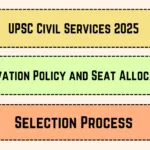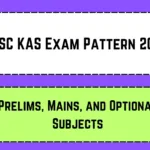The UPSC Civil Services Exam is one of the most prestigious and challenging competitive exams in India. Every year, lakhs of aspirants dream of becoming IAS, IPS, or IFS officers, but only a few succeed. The General Studies (GS) paper plays a crucial role in determining your rank. With the 2025 exam on the horizon, it’s time to focus on mastering conceptual questions in GS. This article will guide you through effective strategies, resources, and tips to tackle these questions with confidence. Let’s dive in!
Key Highlights 📌
| Point | Details |
|---|---|
| Organization Name | Union Public Service Commission (UPSC) |
| Exam Name | Civil Services Examination (CSE) |
| Exam Stages | Preliminary, Mains, and Interview |
| General Studies Weightage | 250 marks in Prelims, 1000 marks in Mains |
| Focus Area | Conceptual clarity and application-based questions |
| Preparation Time | 12-15 months recommended |
| Best Resources | NCERTs, Standard textbooks, and current affairs magazines |
| Official Notification | Expected in February 2025 |
| Official Website | upsc.gov.in |
Understanding Conceptual Questions in General Studies 🧠
What Are Conceptual Questions?
Conceptual questions in the UPSC exam test your deep understanding of a topic rather than rote memorization. These questions often require you to analyze, interpret, and apply knowledge to real-world scenarios. For example, instead of asking, “What is the GDP of India?” the question might be, “How does GDP growth impact employment in India?”
Why Are They Important?
The UPSC has been increasingly focusing on application-based questions to assess a candidate’s ability to think critically. Mastering conceptual questions can help you score well in both Prelims and Mains, as they form the backbone of the GS papers.
Step-by-Step Preparation Strategy for Conceptual Questions 📚
1. Build a Strong Foundation
Start with the basics. NCERT textbooks (Class 6 to 12) are your best friends for building a strong foundation. They explain concepts in simple language, making it easier to understand complex topics.
2. Focus on Current Affairs
Current affairs are a goldmine for conceptual questions. Read newspapers like The Hindu or Indian Express daily. Make notes on how current events relate to static topics like polity, economy, and environment.
3. Use Standard Reference Books
Once you’ve covered the basics, move on to standard books like:
- Polity: Indian Polity by M. Laxmikanth
- Economy: Indian Economy by Ramesh Singh
- Environment: Environment by Shankar IAS
These books provide in-depth knowledge and help you connect concepts.
4. Practice Answer Writing
Conceptual understanding is useless if you can’t express it clearly. Practice writing answers daily. Focus on structuring your answers with an introduction, body, and conclusion.
How to Analyze and Interpret Data for Conceptual Questions 📊
Understanding Data-Based Questions
UPSC often includes graphs, charts, and tables in GS questions. To tackle these:
- Identify the trend: Look for patterns like growth, decline, or stagnation.
- Relate to concepts: Connect the data to relevant topics like GDP, poverty, or climate change.
- Draw conclusions: Summarize your analysis in a few lines.
Example:
If a question shows a graph on India’s unemployment rate, you should:
- Analyze the trend (rising/falling).
- Relate it to economic policies or global events.
- Suggest measures to improve the situation.
Common Mistakes to Avoid While Preparing for Conceptual Questions ❌
1. Relying Solely on Memorization
Memorizing facts won’t help you answer conceptual questions. Focus on understanding the “why” and “how” behind every topic.
2. Ignoring Current Affairs
Static knowledge alone is not enough. UPSC loves to link current events with static topics. Stay updated!
3. Overloading with Resources
Stick to a few reliable resources instead of juggling multiple books. Quality over quantity!
Recommended Resources for Conceptual Preparation 📖
| Subject | Recommended Resources |
|---|---|
| Polity | Indian Polity by M. Laxmikanth |
| Economy | Indian Economy by Ramesh Singh |
| History | India’s Struggle for Independence by Bipan Chandra |
| Geography | Certificate Physical and Human Geography by Goh Cheng Leong |
| Environment | Environment by Shankar IAS |
| Current Affairs | The Hindu, Yojana Magazine, and PIB updates |
Time Management Tips for Effective Preparation ⏰
1. Create a Study Plan
Divide your time wisely between static and dynamic topics. Allocate at least 2 hours daily for current affairs.
2. Revise Regularly
Revision is key to retaining concepts. Use techniques like mind maps and flashcards to make revision effective.
3. Take Mock Tests
Mock tests help you practice conceptual questions under exam conditions. Analyze your performance and work on weak areas.
Final Thoughts on Staying Motivated 🌟
Preparing for UPSC is a marathon, not a sprint. Stay consistent, believe in yourself, and keep your end goal in mind. Remember, every topper was once a beginner who refused to give up. Good luck! 🚀
Kriti Reddy is a freelance writer specializing in exam results and admit cards. With a background in Psychology and 4+ years of experience, Kriti enjoys creating informative content for students. She loves reading novels.







